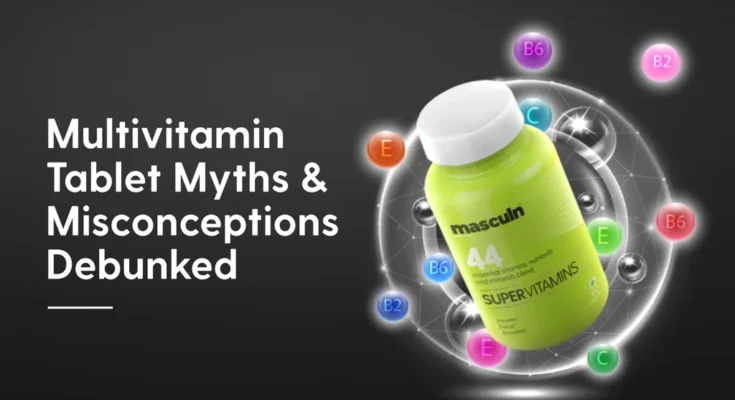Are You Falling for These Common Myths About Supplements and Vitamins?
In the realm of health and wellness, the conversation around supplements and vitamins is packed with myths and misconceptions. For health enthusiasts, wellness seekers, and nutritionists, understanding the facts is crucial to making informed decisions. This blog post aims to debunk common myths about supplements and vitamins, helping you separate fact from fiction and make choices that truly benefit your health.
Myth 1: Supplements Cannot Replace a Healthy Diet
One of the most widely believed myths is that supplements can replace a healthy diet. While supplements can help fill nutritional gaps, they cannot replicate the variety of nutrients and benefits provided by a balanced diet. Whole foods offer a complex combination of vitamins, minerals, fiber, and other essential nutrients that supplements simply can’t match. For instance, an apple contains not only vitamin C but also fiber, antioxidants, and other phytonutrients that work together to promote health. Relying solely on supplements would deprive your body of these synergistic benefits.
In addition, whole foods are often more bioavailable than supplements. This means your body can absorb and use the nutrients from whole foods more efficiently. For example, the iron in spinach is absorbed more readily than the iron in most supplements. Eating a balanced diet ensures you’re getting a wide range of nutrients in their most effective forms.
Lastly, whole foods contribute to overall well-being in ways that supplements cannot. The act of eating whole foods involves chewing, which aids in digestion, and the variety of textures and flavors can enhance your eating experience and satisfaction. Therefore, while supplements can be a helpful addition, they should never replace whole foods in a healthy diet.
Myth 2: More Vitamins Does Not Mean Better Health 
Another common myth is that taking more vitamins will lead to better health. In reality, excessive intake of vitamins can be harmful and may lead to toxicity. For example, fat-soluble vitamins like A, D, E, and K can accumulate in the body and cause adverse effects. High levels of vitamin A can lead to liver damage, while too much vitamin D can cause calcium buildup in the blood, leading to kidney problems and other issues.
It’s important to stick to recommended dosages and consult with a healthcare provider before taking high doses of any vitamin. Over-the-counter supplements often contain vitamin levels far exceeding the daily recommended intake, putting individuals at risk for toxicity. For instance, many multivitamins contain 1000% of the daily value for certain nutrients, which can be dangerous if taken continuously over time.
Furthermore, more is not always better when it comes to vitamins. Some vitamins and minerals can interfere with each other’s absorption. For example, high doses of zinc can inhibit the absorption of copper, leading to deficiencies. Therefore, it’s best to aim for balanced intake through a varied diet and consult healthcare professionals for personalized advice on supplementation.
Myth 3: Not All Supplements Are Safe and Natural
The belief that all supplements are safe and natural is another widespread myth. The truth is, not all supplements are created equal. Some may contain harmful additives or contaminants, and the term “natural” does not always mean safe. For instance, certain natural supplements have been found to contain heavy metals, pesticides, or other contaminants that can harm your health.
It’s crucial to choose reputable brands and check for third-party testing to ensure quality and safety. Look for certifications from organizations like the U.S. Pharmacopeia (USP) or NSF International, which test supplements for purity and potency. These certifications provide an extra layer of assurance that the product contains what it claims and is free from harmful substances.
Additionally, even natural supplements can have potent effects and should be used cautiously. Just because a supplement comes from a plant does not mean it’s safe for everyone. For example, St. John’s Wort, a popular herbal supplement, can interact with several medications, including antidepressants and birth control pills, reducing their effectiveness. Always research and consult with a healthcare provider before starting any new supplement.
Myth 4: Vitamin C Cannot Prevent Colds 
A common myth many believe is that vitamin C can prevent colds. While vitamin C is essential for immune function, there is limited evidence that it can actually prevent colds. Studies have shown that vitamin C might help reduce the duration and severity of cold symptoms, but it is not a cure-all. The idea that loading up on vitamin C will keep you from getting sick is not supported by scientific evidence.
Maintaining a healthy lifestyle, including a balanced diet, regular exercise, and adequate sleep, is more effective for overall immune support. These lifestyle choices help keep your immune system strong and better equipped to fight off infections. Vitamin C can be a part of this healthy lifestyle, but it should not be relied upon solely for cold prevention.
It’s also worth noting that taking too much vitamin C can have side effects, such as stomach upset and diarrhea. The body can only absorb a certain amount of vitamin C at one time, and excess amounts are excreted in the urine. Therefore, it’s best to get your vitamin C from a balanced diet rich in fruits and vegetables rather than relying on high-dose supplements.
Myth 5: Supplements Do Have Side Effects
The myth that supplements don’t have side effects is dangerous. Supplements can interact with medications and cause side effects. For instance, taking high doses of vitamin K can interfere with blood thinners, potentially leading to serious health issues. Likewise, supplements like ginkgo biloba can increase the risk of bleeding, especially when taken with anticoagulant medications.
Always inform your healthcare provider about any supplements you are taking to avoid potential interactions. This is particularly important if you are taking prescription medications, as some supplements can alter the effectiveness of these drugs. Your healthcare provider can help you determine which supplements are safe for you and at what doses.
Even “safe” supplements can cause side effects if taken inappropriately. For example, magnesium supplements can cause digestive issues like diarrhea and cramping if taken in high doses. It’s essential to follow the recommended dosages and guidelines provided by healthcare professionals and the supplement manufacturer to minimize the risk of side effects.
Myth 6: Most People Can Get Enough Nutrients from a Well-Balanced Diet
Another myth is that you need supplements to get enough nutrients. Most people can get the necessary nutrients from a well-balanced diet. Supplements are beneficial for certain populations, such as pregnant women, elderly individuals, or those with specific nutrient deficiencies, but they are not essential for everyone. For instance, folic acid supplements are recommended for pregnant women to prevent birth defects, and vitamin B12 supplements are often necessary for vegans and vegetarians.
For the general population, a diet rich in fruits, vegetables, whole grains, lean proteins, and healthy fats can provide all the essential nutrients needed for good health. Eating a variety of foods ensures that you get a wide range of nutrients in their natural forms, which are often more bioavailable and effective than synthetic supplements.
It’s important to focus on food first and use supplements as an adjunct when necessary. If you suspect you have a nutrient deficiency, it’s best to consult with a healthcare provider who can perform tests and provide personalized recommendations based on your specific needs.
Myth 7: Herbal Supplements Are Not Always Safe
The myth that herbal supplements are always safe is misleading. Herbal supplements can have potent effects and may not be safe for everyone. Some can interact with medications or cause allergic reactions. For example, echinacea, commonly used for immune support, can cause allergic reactions in people who are allergic to ragweed or other related plants.
It’s important to research and consult with a healthcare provider before starting any herbal supplement. Just because a supplement is labeled as “natural” does not mean it’s free from side effects or interactions. Your healthcare provider can help you determine which herbal supplements are appropriate for you and ensure they do not interfere with any medications you are taking.
Additionally, the quality and potency of herbal supplements can vary widely between brands. Choose supplements from reputable companies that conduct third-party testing to ensure the product’s quality and purity. This can help you avoid potential contaminants and ensure you are getting a product that contains the advertised ingredients.
Conclusion
In conclusion, it’s crucial to approach supplements and vitamins with a well-informed mindset. While they can be beneficial for filling nutritional gaps and supporting specific health needs, they are not a substitute for a balanced diet. Understanding the facts behind common myths can help you make informed decisions that truly benefit your health. Always consult with a healthcare provider before starting any new supplement regimen to ensure it is safe and appropriate for your individual needs. For more personalized guidance, consider reaching out to a nutritionist or health professional who can provide tailored advice based on your unique health goals and needs.
Read Also : Transform Your Health with Smart Lifestyle Choices




